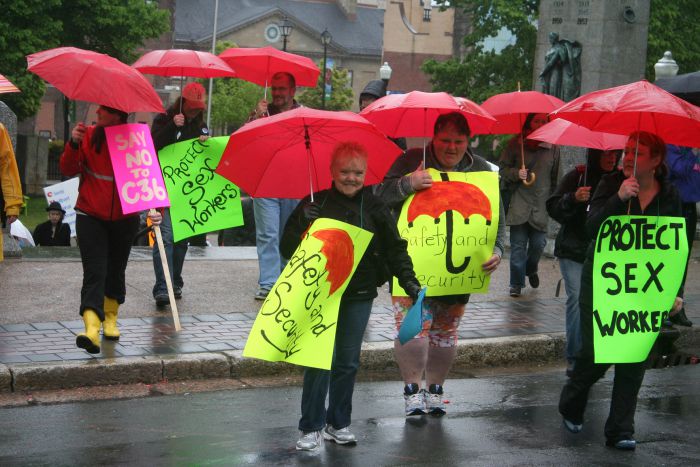KJIPUKTUK (Halifax) – A story on sex work and the law published last week by CBC Nova Scotia featured plenty of cops talking about whether to charge the people who buy sex, or the people who provide it. What was lacking was the voice of even a single sex worker.

The article contrasts the approach taken to prostitution cases by Cape Breton Regional Police, who have been arresting people who buy sex, and Halifax Regional Police, where the focus has mainly been on pimps after “someone has been victimized.”
The reporter interviews a Halifax cop, a Cape Breton cop and a Swedish cop. The last two both praise the so-called Nordic model, where the focus is on the buyers of sex. This approach became the law in Canada in December 2014 when Harper was still in power.
Many sex workers and allies argued at the time that the legislation would make prostitution even more dangerous, and merely push sex workers out of sight. However, that is not a line of questioning the article pursues.
27 men were charged by Sydney police with obtaining sexual services for consideration in 2015. But what the Sydney sex workers thought of it apparently doesn’t matter.
Sex workers, as well as organizations such as Halifax’ Stepping Stone, have come out opposed to Bill C-36 and the Nordic model that inspired it.
Is it really that hard to let them have their say?
If you can, please support the Nova Scotia Advocate so that it can continue to cover issues such as poverty, racism, exclusion, workers’ rights and the environment in Nova Scotia. A pay wall is not an option since it would exclude many readers who don’t have any disposable income at all. We rely entirely on one-time donations and a tiny but mighty group of kindhearted monthly sustainers.




Your website is great and the anti poverty work you do is inspiring. However on the sex work question, your liberal feminist position is not the only one that speaks to the issue of the marginalisation of sex workers in society.
Is sex work dignified work? Can it ever be? The nordic model approaches sex work as a clear manifestation of the problem of violence against women (by men) in our society and seeks to stigmatise the notion that women should be available to be bought for men’s pleasure. Stigmatise and then put some actual teeth into the law by punishing the entitled men who see it as their right to buy women for their own personal sexual pleasure. In Canada, unfortunately, we do not, as Sweden does, offer substantive progams to really help women leave the sex trade; we have a fraying social safety net, social assistance rates that are disgustingly low, lack of affordable housing etc… (I don’t need to tell you about all of that). That is the piece that is missing here. However, the decriminalisation of women in the sex trade and the criminalisation of men who buy women is a step in the right direction.
And if you’re interested in sex worker’s views, do some reporting: find some sex workers and give them the platform you wish them to have. But then please find some who have been able to leave it and see it for what it was: exploitation.
Thank you Edson Castilho
Thank you for this op-ed Robert. Research, service organizations, advocates and importantly sex workers themselves, report increased harm and marginalization that under the Swedish Model. Full decriminalization of the trade is essential. Moreover, narratives that frame sex workers as either criminals who need to be persecuted, or victims who need to be saved, is not helpful. Stigma is not a pathway to human rights.
I recommend folks pick up the book Sex Workers in the Maritimes Talk Back. The authors have done a great job breaking down what happens when police and law enforcement control the narrative in the media, and the implications this has on policy.